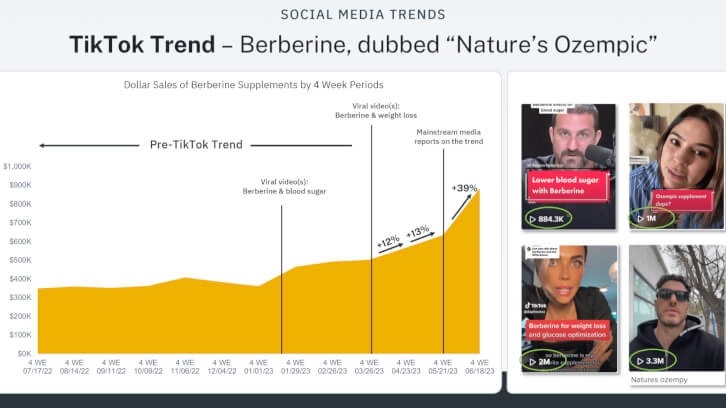The skinny on berberine: Is it really #naturesozempic?

“To be succinct, berberine is not nature’s Ozempic, despite the social media assertions,” said Mark Miller, PhD, MBA, FACN, CNS, president at Kaiviti Consulting. “When one does not appreciate mechanisms of action, it is highly likely that mistakes will be made when aligning a natural product with a popular pharmaceutical.”
Other industry pundits pointed out that there may also be some unwanted side effects from chasing the latest weight-loss fad by connecting the botanical to an injectable anti-diabetic medication used for off-label benefits.
The TikTok-assisted surge in sales
According to market research firm SPINS, berberine supplements saw a 26.2% increase in year-over-year sales in the 12 months ending May 21, 2023. The initial spike (up 28% compared to the four weeks prior) occurred in January, coinciding with the initial surge in TikTok videos hyping berberine’s ability to lower blood glucose.
“Chatter around berberine continued for a few months before reaching true virality on TikTok around late March with many videos referring to the supplement as 'Nature's Ozempic',” said Evonne Chan, data analyst at SPINS. “This time around, much like the discussion around Ozempic, the supplement was being linked with its purported ability to help with weight loss.”
From there, videos featuring weight-loss journeys with berberine started garnering millions of views, which Chan said led to another sharp increase in sales as followers started to flock to the supplement. By June, the craze had hit mainstream media, with SPINS reporting a 39% jump in the four weeks ending June 18.
Jim Emme, CEO of NOW Foods, recently told NutraIngredients-USA that berberine sales were up 623% before the company ran out of stock, specifying that NOW only makes structure-function claims for berberine related to glucose support.
The Vitamin Shoppe also shared that its customers have shown significant interest in berberine in recent months, prompting the retailer to outline the supplement’s scientific attributes on its ‘What’s Good’ blog.
“Our berberine sales increased greatly in June, and it’s one of the top search terms on vitaminshoppe.com,” said Muriel Gonzalez, president at The Vitamin Shoppe. “Our goal is to provide credible expertise on what supplements like berberine can and cannot do, and we encourage our customers to talk to health professionals and do their research before starting a dietary supplement routine.”
What berberine does and doesn’t do
Dr. Miller said that while berberine and Ozempic have overlapping outcomes on liver health, obesity, cardiovascular health, diabetes, lipoproteins, atherosclerosis, and vascular health, they arrive at these outcomes through entirely different mechanisms.
“Ozempic is a GLP-1 agonist (activates the receptor) resulting in a decrease in appetite. Furthermore, in terms of signal transduction, Ozempic lowers mTOR and raises AMPK activity,” he explained. “But berberine has a much more diverse series of mechanism of action affecting cellular decision making, and AMPK activation is a very small part of that suite of actions, which sets it apart from Ozempic.”
He referenced a study on the potential mechanisms of berberine in the treatment of nonalcoholic fatty liver disease that cited increased insulin sensitivity, regulation of adenosine monophosphate-activated protein kinase (AMPK) pathway, improvement of mitochondrial function, alleviation of oxidative stress, LDLR mRNA stabilization and regulation of gut microenvironment as berberine’s major targets.
Extracted from a variety of medicinal plants including Berberis aquifolium (Oregon grape), Berberis vulgaris (barberry), Hydrastis canadensis (goldenseal), Phellodendron amurense (Amor Cork Tree) and Coptis chinensis (goldenthread), the botanical has a long history of use in traditional medicine to treat infections, diarrhea, and inflammatory disorders.
“This versatile herbal compound offers a wide array of health benefits, such as reducing inflammation, activating AMPK, supporting healthy blood sugar levels, preventing metabolic syndrome, protecting blood vessels, acting as an antioxidant and antimicrobial, and supporting ATP/energy production,” said Jen Palmer, ND, who recently published the e-book “Reverse Aging: Turn Back Time with Berberine”.
The bulk of the berberine research to date has focused on its ability to help regulate blood sugar in people with Type 2 diabetes, however, with a paucity of substantial science supporting its weight loss benefits. There is also the poor absorption/bioavailability issue with berberine, the unknowns about its long-term use and potential side effects including diarrhea, constipation, upset stomach, increased uterine contractions and hypoglycemia in certain populations.
“As far as TikTok, I wouldn’t recommend that as a great source for medical advice,” Palmer added. “Visit a naturopathic doctor or functional medicine doctor if you need guidance with balancing blood sugar or losing weight.”
The problem with chasing the drug
Kenn Israel, founder at Innovation Nutrition Consulting, said that he is concerned by what is happening with natural product customers and marketers since semaglutides (the generic name for drugs like Ozempic, Wegovy and Rybelsus) have been popularized.
“I look at this stuff, and I kind of cringe each time I see these trends come up, or in this case repeat, where the natural products industry is chasing a drug,” he said. “Better understanding the drug, the natural products and the law is important for our industry to maintain its credibility.”
For Ozempic, he recalled the fen-phen weight loss diet pill craze of the 1990s, which in hindsight the New York Times called a “morality tale for our times”. By 1997, hundreds of women were reporting heart valve damage associated with the consumption of the appetite-suppressing drug combination.
“If you're looking to crash off a ton of weight and you don't mind weekly injections with a drug that has potentially grievous side effects, maybe Ozempic is for you,” Israel said.
The drug has been associated with a range of ramifications from nausea, vomiting and diarrhea to diabetic retinopathy, kidney failure and thyroid tumors. In addition, it leads to a sluggish digestive system and unsustainable weight loss after consumers stop injecting.
While Israel recognized berberine as a tool to support healthy weight in combination with lifestyle adjustments, he noted that the botanical is currently under safety review by the European Food Safety Authority to address content, toxicity and use level concerns, with potential spillover effects into the U.S.
“I guess the other issue that I'm really concerned with for the supplements industry is that it's against the rules,” he added. “It's against FDA regulation to compare a dietary supplement product with a drug.”
















